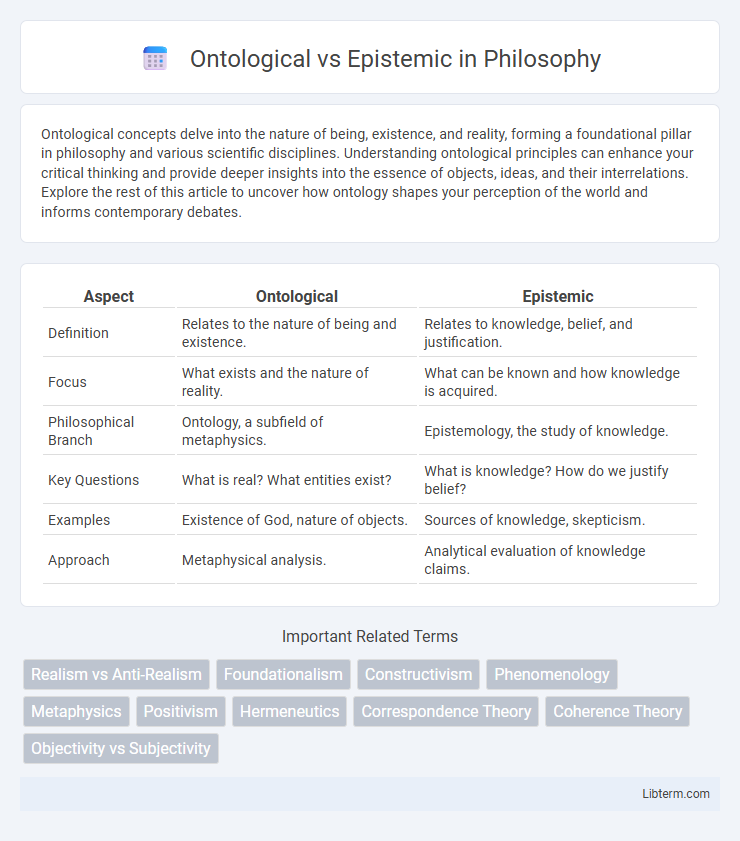Ontological concepts delve into the nature of being, existence, and reality, forming a foundational pillar in philosophy and various scientific disciplines. Understanding ontological principles can enhance your critical thinking and provide deeper insights into the essence of objects, ideas, and their interrelations. Explore the rest of this article to uncover how ontology shapes your perception of the world and informs contemporary debates.
Table of Comparison
| Aspect | Ontological | Epistemic |
|---|---|---|
| Definition | Relates to the nature of being and existence. | Relates to knowledge, belief, and justification. |
| Focus | What exists and the nature of reality. | What can be known and how knowledge is acquired. |
| Philosophical Branch | Ontology, a subfield of metaphysics. | Epistemology, the study of knowledge. |
| Key Questions | What is real? What entities exist? | What is knowledge? How do we justify belief? |
| Examples | Existence of God, nature of objects. | Sources of knowledge, skepticism. |
| Approach | Metaphysical analysis. | Analytical evaluation of knowledge claims. |
Introduction to Ontological and Epistemic Concepts
Ontological concepts address the nature of being and existence, exploring what entities fundamentally constitute reality. Epistemic concepts focus on knowledge acquisition, belief justification, and the limits of human understanding. Understanding these distinctions provides a foundation for analyzing the relationship between what exists and what can be known.
Defining Ontology: Nature of Being
Ontology explores the nature of being, addressing fundamental questions about existence and the categories of reality. It investigates what entities exist, their properties, and their relationships, forming the foundation of metaphysical inquiry. Unlike epistemic concerns focused on knowledge and belief, ontology directly examines what it means for something to be.
Understanding Epistemology: Nature of Knowledge
Epistemology explores the nature, scope, and limits of knowledge, focusing on how knowledge is acquired, justified, and validated. It investigates the relationship between belief, truth, and justification, emphasizing processes such as perception, reasoning, and evidence evaluation. Understanding epistemology clarifies distinctions between what is known (epistemic) and what exists (ontological), enhancing critical thinking and knowledge assessment.
Key Differences Between Ontological and Epistemic Perspectives
Ontological perspectives focus on the nature of being and existence, addressing what entities fundamentally are, whereas epistemic perspectives concentrate on the nature and scope of knowledge, exploring how we come to know and understand reality. Ontology deals with the structure of reality itself, including concepts like objects, properties, and relations, while epistemology investigates the justification, sources, and limits of knowledge. These differences define ontology as a study of what is, and epistemology as a study of how and what we can know.
Historical Development of Ontological and Epistemic Theories
Ontological and epistemic theories have evolved through distinct historical trajectories, with ontology tracing back to Aristotle's Metaphysics, which laid the groundwork for the study of being and existence, while epistemology finds its roots in ancient skepticism and Plato's theory of knowledge. Medieval scholastic philosophers like Thomas Aquinas further integrated ontological and epistemic insights, influencing later developments during the Enlightenment when rationalism and empiricism shaped modern epistemic frameworks. Contemporary philosophy sees ontological debates centered on the nature of reality, contrasted with epistemic concerns about the justification and limits of human knowledge, reflecting their divergent yet intertwined historical legacies.
Ontological Questions in Philosophy
Ontological questions in philosophy explore the nature of being, existence, and reality, seeking to understand what entities fundamentally exist and how they can be categorized. These inquiries delve into concepts such as substance, universals, and the relationship between mind and matter. Ontology forms the foundation for metaphysics by addressing the essence and structure of objects and their properties in the world.
Epistemic Concerns and Methods
Epistemic concerns focus on the nature, scope, and justification of knowledge, emphasizing how beliefs are formed, validated, and communicated. Methods involve empirical investigation, logical analysis, and critical reflection to determine the reliability and sources of information. These processes seek to distinguish justified true belief from mere opinion, shaping theories of knowledge acquisition and validation.
Applications of Ontological vs Epistemic Approaches
Ontological approaches underpin knowledge representation in artificial intelligence by defining the nature and structure of reality through formal ontologies, enabling machine understanding and data interoperability. Epistemic approaches drive reasoning systems and decision-making processes by modeling knowledge, belief, and information acquisition, enhancing adaptive learning and context-aware applications. Combining ontological frameworks with epistemic logic facilitates sophisticated semantic web technologies and intelligent agents capable of dynamic knowledge updating and reasoning under uncertainty.
Common Confusions and Overlaps
Ontological concerns deal with the nature of being and existence, while epistemic focuses on knowledge and belief about that existence. Common confusions arise when assumptions about reality are mistaken for knowledge claims, blurring the line between what *is* versus what we *know* or *believe* to be true. Overlaps occur in philosophical debates where the status of entities depends on epistemic access, such as the existence of abstract objects informed by our understanding or awareness.
Conclusion: Integrating Ontological and Epistemic Insights
Integrating ontological and epistemic insights enriches our understanding by combining the nature of being with the limits and scope of knowledge. Ontological frameworks establish what exists, while epistemic approaches clarify how and what we can know about these entities. This synthesis fosters comprehensive models that accommodate both existence and cognition, enhancing philosophical, scientific, and practical analyses.
Ontological Infographic

 libterm.com
libterm.com